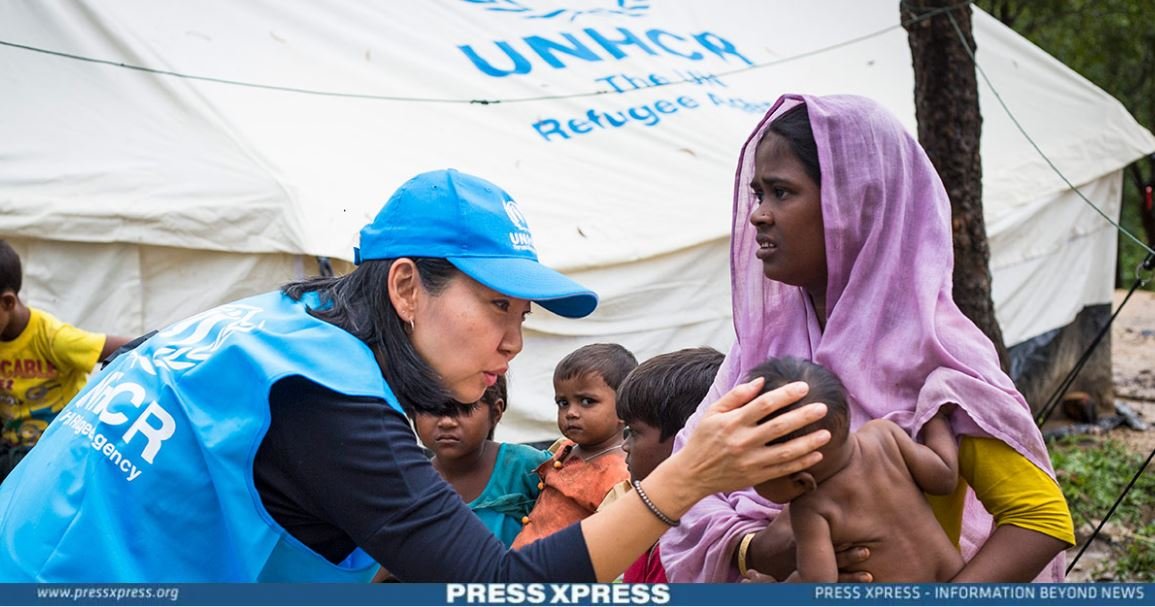Bangladesh’s enduring resilience and compassion in hosting Rohingya refugees amidst significant challenges emphasize the collective responsibility of the international community to alleviate their plight and advocate for a sustainable solution
The UNHCR, the UN refugee agency, along with other humanitarian partners on Wednesday, March 13, 2024, urged the international community to increase efforts to aid and protect the Rohingya refugees and their host communities, primarily in Bangladesh, where nearly 1 million Rohingyas have sought shelter since fleeing Myanmar seven years ago. The 2024 Joint Response Plan, led by Bangladeshi authorities, seeks $852.4 million to assist around 1.35 million people, encompassing both Rohingyas and host communities.
You can also read: Remittance: Bangladesh’s Financial Orchestra Force
The plan focuses on providing essential services such as food, shelter, healthcare, water access, protection, education, and livelihood opportunities. With 95% of Rohingya households in Bangladesh considered vulnerable and dependent on aid, sustained assistance is crucial, especially for women and children who face heightened risks of abuse and exploitation. The funding shortfall in previous years has exacerbated the plight of Rohingya refugees, highlighting the urgent need for continued international support.
Additionally, efforts to fulfill pledges made at the Global Refugee Forum in Geneva are emphasized, aiming to enhance self-reliance among Rohingya refugees and mitigate the risks associated with dangerous boat journeys.
While global funding remains crucial, it must be coupled with a fair apportionment of responsibility among financially affluent nations. Ideally, countries should step up, thereby easing the burden on other nations contending with an annual influx of refugees.
Massive Humanitarian Aid Initiative
The Joint Response Plan, which involves 117 partners, almost half of whom are Bangladeshi organizations, is designed to assist approximately 1 million Rohingyas in Cox’s Bazar and on Bhasan Char Island, as well as 346,000 individuals from host communities.
Ambassador Masud Bin Momen, Foreign Secretary of Bangladesh; Mohammad Tofazzel Hossain Miah, Principal Secretary to the Bangladesh Prime Minister; Filippo Grandi, UN High Commissioner for Refugees; and Amy Pope, Director General of the International Organization for Migration, are presenting the plan and its associated financial requirements to donors in Geneva.
Global Aid For The Rohingya Crisis

It is noteworthy that since 2017, the UK has provided over £373 million in funding for Rohingya refugees in Bangladesh and more than £30 million for Rohingya and other Muslim minorities in Myanmar. In December 2023, during the Global Refugee Forum, the UK announced an additional £7 million in aid for Rohingya refugees in Bangladesh and for addressing the humanitarian crisis in Myanmar.
Alongside the United Kingdom, the United States has earmarked over $1.9 billion in humanitarian aid for Rohingya refugees in Bangladesh and nearby areas, aiding those affected by the ongoing turmoil in Myanmar and assisting communities hosting refugees from the nation.

The World Bank Group has committed $480 million in grants to address the requirements of Rohingya refugees and host communities in Bangladesh, while also bolstering health, education, water, sanitation, and social protection services.
Numerous countries, such as Canada, Japan, Germany, Norway, Sweden, Australia, France, Switzerland, Saudi Arabia, Qatar, Kuwait, Turkey, China, India, and others, have contributed to the Rohingya response, demonstrating a broad international effort to tackle the crisis.
How Is Bangladesh Bearing The Rohingya Refugee Burden?
For seven years, Bangladesh has shouldered the immense burden of the Rohingya crisis with unwavering resilience and compassion. Since the mass exodus of Rohingya refugees from Myanmar began in 2017, Bangladesh has been at the forefront of providing shelter, food, and medical aid to over a million displaced individuals.
Despite its own economic challenges and limited resources, Bangladesh has opened its borders and refugee camps, demonstrating remarkable solidarity and humanity. The government, along with numerous NGOs and international organizations, has worked tirelessly to address the urgent needs of the Rohingya population, including healthcare, education, and protection from exploitation and violence.
However, the prolonged presence of refugees has strained local resources, heightened environmental concerns, and exacerbated social tensions. Despite these challenges, Bangladesh continues to show remarkable resilience and remains committed to finding a sustainable solution to the Rohingya crisis, advocating for their rights and seeking international support for their safe repatriation and resettlement.
Myanmar Turmoil Hinders Repatriation
On January 27, 2024, Dr. Hasan Mahmud, former Foreign Minister of Bangladesh, once again urged the global community to apply pressure on Myanmar to repatriate Rohingya refugees residing in Cox’s Bazar camps since 2017.
Dr. Hasan Mahmud pointed out that the internal unrest in Myanmar has hurt the repatriation process, which has remained stagnant since 2018 due to Myanmar’s non-cooperation and the Rohingya’s reluctance to return without guarantees of citizenship, security, and basic rights. The situation has deteriorated further, causing increased fear and uncertainty among the refugees following the recent coup by the Myanmar military.
Bangladesh remains vigilant and has been actively involved in discussions with the Myanmar government and the global community to find a sustainable resolution to the crisis. He urged the international community to increase pressure on Myanmar to create conducive conditions for the voluntary, secure, and dignified return of the Rohingyas to their homeland.
In conclusion the urgent call by the UNHCR and humanitarian partners for increased support to Rohingya refugees and host communities emphasizes the critical need for sustained aid. With the 2024 Joint Response Plan aiming to assist 1.35 million people, international solidarity is imperative to address the ongoing crisis and ensure the safety and well-being of vulnerable populations.
Efforts must continue to fulfill pledges made at global forums, while equitable burden-sharing among nations remains essential. Bangladesh’s enduring resilience and compassion in hosting Rohingya refugees amidst significant challenges emphasize the collective responsibility of the international community to alleviate their plight and advocate for a sustainable solution.


